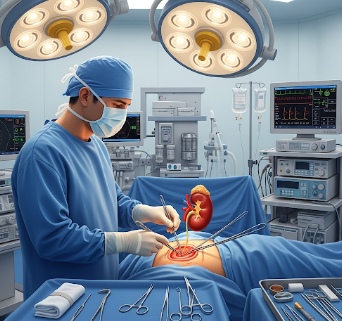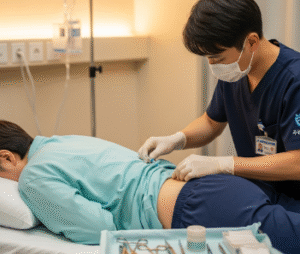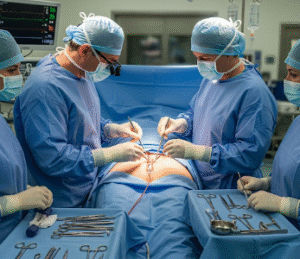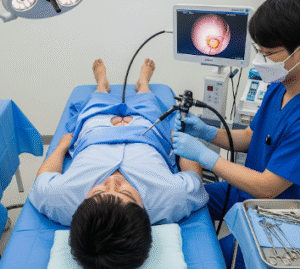Overview
Nephrectomy is the surgical removal of a kidney. It may involve removing one kidney (simple nephrectomy), part of a kidney (partial nephrectomy), or a kidney along with nearby structures (radical nephrectomy). The procedure is most often performed for kidney cancer, severe kidney damage, or donation for transplantation.
In South Korea, nephrectomy is performed with world-class precision, often using laparoscopic or robotic-assisted techniques, which result in smaller incisions, faster recovery, and excellent long-term outcomes. Korean hospitals are globally recognized for advanced urology care, making the country a top destination for kidney surgery.
What is Nephrectomy?
A nephrectomy is the surgical removal of a kidney or part of it to treat disease, injury, or to provide a healthy kidney for transplant. Depending on the condition, surgeons may choose:
✔ Simple nephrectomy: Entire kidney removed.
➔ Partial nephrectomy: Only the diseased portion removed (nephron-sparing).
● Radical nephrectomy: Kidney removed along with adrenal gland, lymph nodes, or surrounding fat.
★ Donor nephrectomy: Performed on healthy individuals donating a kidney for transplant.
What are the Benefits?
A nephrectomy can be life-saving and offer multiple health benefits:
✔ Removes cancerous or severely damaged kidney tissue.
➔ Preserves kidney function (in partial nephrectomy).
● Enables kidney transplantation in donor cases.
★ Reduces pain, infection, or bleeding caused by diseased kidneys.
➤ Improves long-term survival for cancer patients.
Procedure Details
1) How should I prepare for Nephrectomy?
Preparation involves thorough medical assessment and lifestyle adjustments:
✔ Pre-operative tests: Blood tests, CT/MRI scans, kidney function assessments.
➔ Medication review: Stopping blood thinners or adjusting other prescriptions.
● Fasting: No food or drink for 6–8 hours before surgery.
★ Bowel preparation: In some cases, cleansing is required.
➤ Counseling: Patients meet the surgical and anesthesia team to understand risks, benefits, and recovery expectations.
2) What happens during the procedure Nephrectomy?
The surgery is done under general anesthesia and lasts 2–4 hours depending on complexity:
✔ Incision type: Surgeons may use open, laparoscopic, or robot-assisted techniques.
➔ Kidney removal: Diseased or donor kidney carefully separated from blood vessels and ureter.
● Partial nephrectomy: Diseased tissue removed, healthy kidney tissue preserved.
★ Radical nephrectomy: Kidney and surrounding tissues removed to prevent cancer spread.
➤ Closure: Incisions closed and drainage tubes may be placed.
South Korea leads in minimally invasive nephrectomy, reducing pain and hospital stays.
3) What happens after a Nephrectomy?
Recovery begins immediately in a monitored hospital setting:
✔ Hospital stay: Typically 3–7 days, shorter for laparoscopic cases.
➔ Catheter: May remain for 1–2 days to monitor urine output.
● Pain management: Modern pain-control methods ensure comfort.
★ Activity restrictions: Heavy lifting avoided for 4–6 weeks.
➤ Follow-up: Regular imaging and blood tests to monitor remaining kidney function.
Risks / Benefits
Possible Risks:
➔ Bleeding or infection at surgical site
✔ Damage to nearby organs or blood vessels
● Hernia formation at incision site
★ Reduced kidney function if only one kidney remains
➤ Blood clots or anesthesia complications
Major Benefits:
✔ Cures localized kidney cancer
➔ Relieves pain and symptoms from diseased kidney
● Allows kidney donation to save another life
★ Advanced minimally invasive surgery in Korea improves safety and outcomes
Recovery and Outlook
✔ Return to normal activities: Within 4–6 weeks for most patients.
➔ Lifestyle adjustments: Patients with one kidney should stay hydrated and avoid kidney-toxic medications.
● Partial nephrectomy patients: Typically maintain excellent kidney function.
★ Long-term monitoring: Regular checkups ensure healthy kidney function.
➤ Cancer survival rates: Excellent in Korea due to early diagnosis and advanced surgical skill.
When To Call the Doctor
Patients should seek medical attention if they experience:
✔ Severe pain or swelling at the incision site
➔ Persistent fever or chills (possible infection)
● Difficulty urinating or significant drop in urine output
★ Blood in urine after recovery
➤ Shortness of breath or chest pain (possible clot or complication)
Best Korea Option / Process
South Korea is one of the world leaders in kidney surgery, with advanced medical infrastructure and highly trained specialists. Patients benefit from:
✔ Top hospitals like Seoul National University Hospital, Asan Medical Center, Severance Hospital, and Samsung Medical Center.
➔ Robotic and laparoscopic nephrectomy, reducing recovery time and scarring.
● Multidisciplinary care including oncologists, nephrologists, and urologists.
★ International patient services with translators, travel assistance, and comprehensive care.
➤ High survival and satisfaction rates, making Korea a preferred choice for medical tourism.
✅ Highlights:
✔ Surgical removal of one or both kidneys, partial or complete
➔ Treats kidney cancer, severe damage, or allows organ donation
● Korea offers robotic-assisted surgery with faster recovery
★ Risks include infection, bleeding, or reduced kidney function
➤ Top Korean hospitals provide world-class treatment and patient support













